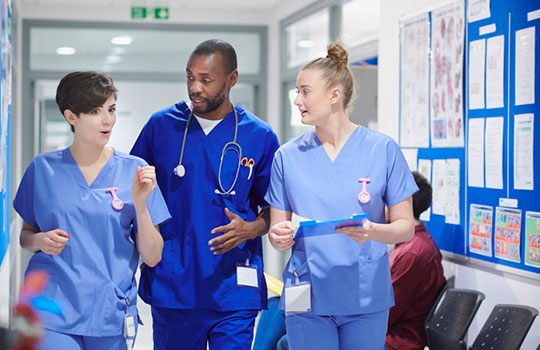
Kirstin May and Lucy Williams talk about the difficulties SAS and LE doctors face in the workplace and what can be done to overcome them
A recent survey by the General Medical Council found that 30% of Specialty and Associate Specialist (SAS) and 23% of Local Employed (LE) doctors have been bullied, undermined, or harassed in the workplace in the past year. This was the GMC’s first ever survey in to these roles. It was undertaken due to the increasing number of doctors in such roles. The report’s initial findings make for a sobering read.
The expertise and contributions offered by this staff group should not be underestimated, especially at a time of workforce shortages. 83% of these doctors have been practising for more than 15 years. Sadly, many of the 6,400 respondents have experienced difficulty accessing training to maintain skills, let alone advance their career. Overall, there is insufficient support related to wellbeing, appraisal, and revalidation.
It is clear that SAS and LE doctors contribute more than pure clinical service. More than 90% undertake additional activities, ranging from teaching, research and clinical governance, to appraising other doctors. The majority are involved in training others, but overall receive less support from employers than consultant trainers.
We are both SAS doctors and we know all too well that complaints of SAS and LE doctors being treated poorly in the workplace are not new. Similar results have been published in other surveys conducted by the BMA. As a group SAS and LE doctors are significantly less likely to find that their workplace is supportive compared to other staff groups. They are less clear about where to take concerns, including concerns about bullying, undermining treatment and harassment.
We all wish to belong and to be part of a team. A feeling of security, support, and a sense of inclusion contributes to a shared vision, which in turn increases wellbeing and productivity. Workplace behaviour and human interactions have an impact on clinical decision making and patient outcomes.
So, how should you treat your SAS and LE colleagues and what does a satisfying career in this role look like? The answer is simple: treat your SAS colleague as you would wish to be treated. We may be working together for many years, so make an effort to get to know us. Include us in departmental business meetings and social events. It is important we are seen to work together, not just alongside each other at the same hospital. When asking “how are you?” in the morning, be interested in your colleague’s answer.
The majority of SAS and LE doctors obtained their primary medical qualification abroad, which may be reflected in cultural differences. Rather than seeing this as a nuisance, be interested in how other cultures behave, socially and professionally, and enjoy the diversity. Moving country and culture is an intensely stressful undertaking, so be prepared to be supportive, not just in relation to work, but also to help colleagues integrate into local life outside work. If there are real or perceived difficulties, be open about them. Discuss, don’t judge.
Professionally speaking, SAS and LE roles are dominated by service commitments, but there needs to be a sustainable balance between regular daytime commitments and night or weekend work. With ever increasing pressure to fill rota gaps and difficulty recruiting, it is all too tempting to ask SAS and LE doctors to work mostly out of hours, but please don’t pressure us into unsustainable working patterns that you wouldn’t use for other staff groups.
Regular commitments and the chance to develop a special interest help us to develop stable professional relationships with colleagues in our own and other specialities. Outside of training grades we all share the same requirements for appraisal and revalidation and hence have the same needs for professional development. Supporting professional activities (SPA) time for revalidation should be non-discriminatory. We all need to participate in clinical governance, morbidity and mortality meetings and continuous professional development, so please share the burden of clinical work equally with us, so we also get a chance to contribute to this.
Will SAS and LE doctors ever be truly treated in the same way as other senior staff? Our personal experience as full council members at the Royal College of Anaesthetists shows they can. We have been given the chance to contribute and lead. An equal voice, equal rights, equal workload, and equal responsibilities are all possible. There is plenty of room to develop and grow personally when given the opportunity.
And to all the SAS and LE doctors out there, we would recommend grasping opportunities as they arise. If there is something you wish to do which is offered to consultants, question whether it could be you instead or as well. Be a team member and pursue the common goal. If a door seems closed try and open it to peep through the gap—you may be surprised what you find on the other side.
Kirstin May is an associate specialist in anaesthetics at Horton Hospital Banbury, Oxford University Hospitals NHS Foundation Trust. She also a council member at the Royal College of Anaesthetists and sits on the RCoA SAS committee.
Lucy Williams is an associate specialist in anaesthetics and pain medicine at Great Western Hospital, Swindon. She also a council member at the Royal College of Anaesthetists and sits on the RCoA SAS committee.
Competing interests: None declared.
"colleague" - Google News
February 26, 2020 at 06:28PM
https://ift.tt/2PuKMDL
Kirstin May and Lucy Williams: Treat your SAS colleague as you would wish to be treated - The BMJ - The BMJ
"colleague" - Google News
https://ift.tt/2Uvr5Ps
Shoes Man Tutorial
Pos News Update
Meme Update
Korean Entertainment News
Japan News Update

No comments:
Post a Comment